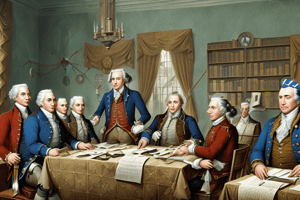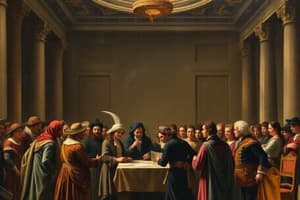Podcast
Questions and Answers
What year was the Articles of Confederation ratified?
What year was the Articles of Confederation ratified?
Which event directly followed Shays's Rebellion?
Which event directly followed Shays's Rebellion?
What does the Northwest Ordinance of 1787 pertain to?
What does the Northwest Ordinance of 1787 pertain to?
Which document included a series of essays advocating for the ratification of the Constitution?
Which document included a series of essays advocating for the ratification of the Constitution?
Signup and view all the answers
What was a primary concern of the Anti-Federalists during the ratification debate?
What was a primary concern of the Anti-Federalists during the ratification debate?
Signup and view all the answers
What significant action did Congress take in 1808 regarding slavery?
What significant action did Congress take in 1808 regarding slavery?
Signup and view all the answers
What was the main purpose of the Land Ordinances approved between 1784 and 1785?
What was the main purpose of the Land Ordinances approved between 1784 and 1785?
Signup and view all the answers
Which battle did Little Turtle lead before his eventual defeat?
Which battle did Little Turtle lead before his eventual defeat?
Signup and view all the answers
What was one significant achievement of the Confederation government?
What was one significant achievement of the Confederation government?
Signup and view all the answers
What issue delayed the ratification of the Articles of Confederation?
What issue delayed the ratification of the Articles of Confederation?
Signup and view all the answers
What was the position taken by Congress regarding Indian lands after independence?
What was the position taken by Congress regarding Indian lands after independence?
Signup and view all the answers
Which tribes were involved in treaties with Congress concerning land surrenders?
Which tribes were involved in treaties with Congress concerning land surrenders?
Signup and view all the answers
How many Indians inhabited the western region acknowledged by Congress?
How many Indians inhabited the western region acknowledged by Congress?
Signup and view all the answers
Why did land-rich states cede their western land claims?
Why did land-rich states cede their western land claims?
Signup and view all the answers
What conflicting pressures did the Confederation government face regarding western land?
What conflicting pressures did the Confederation government face regarding western land?
Signup and view all the answers
What ultimately led to the national control of western territory?
What ultimately led to the national control of western territory?
Signup and view all the answers
What was the primary purpose of the Constitutional Convention held in May 1787?
What was the primary purpose of the Constitutional Convention held in May 1787?
Signup and view all the answers
Which notable figures were absent from the Constitutional Convention?
Which notable figures were absent from the Constitutional Convention?
Signup and view all the answers
How did the social and economic status of most delegates at the Constitutional Convention influence their decisions?
How did the social and economic status of most delegates at the Constitutional Convention influence their decisions?
Signup and view all the answers
What was James Madison's role during the deliberations of the Constitutional Convention?
What was James Madison's role during the deliberations of the Constitutional Convention?
Signup and view all the answers
What was a significant factor that led nationalists to desire a stronger federal government?
What was a significant factor that led nationalists to desire a stronger federal government?
Signup and view all the answers
Why was the debate during the Constitutional Convention held in private?
Why was the debate during the Constitutional Convention held in private?
Signup and view all the answers
Which of the following statements is true regarding the delegates’ educational background?
Which of the following statements is true regarding the delegates’ educational background?
Signup and view all the answers
What significant consequence did John Adams believe the Constitutional Convention would have?
What significant consequence did John Adams believe the Constitutional Convention would have?
Signup and view all the answers
What does the principle of divided sovereignty refer to?
What does the principle of divided sovereignty refer to?
Signup and view all the answers
What is the primary function of the system of checks and balances outlined in the Constitution?
What is the primary function of the system of checks and balances outlined in the Constitution?
Signup and view all the answers
What mechanism allows Congress to override a presidential veto?
What mechanism allows Congress to override a presidential veto?
Signup and view all the answers
How are federal judges appointed to ensure their independence?
How are federal judges appointed to ensure their independence?
Signup and view all the answers
What can happen to a president for high crimes and misdemeanors?
What can happen to a president for high crimes and misdemeanors?
Signup and view all the answers
Which group within the Constitutional Convention was particularly divided over the issue of slavery?
Which group within the Constitutional Convention was particularly divided over the issue of slavery?
Signup and view all the answers
What statement best describes the relationship between national and state governments?
What statement best describes the relationship between national and state governments?
Signup and view all the answers
What is necessary for the president to effectively check the power of Congress?
What is necessary for the president to effectively check the power of Congress?
Signup and view all the answers
What did the Anti-Federalists emphasize as vital to their vision of government?
What did the Anti-Federalists emphasize as vital to their vision of government?
Signup and view all the answers
Which right did Anti-Federalists argue was not protected by the Constitution?
Which right did Anti-Federalists argue was not protected by the Constitution?
Signup and view all the answers
What was Patrick Henry's view of the absence of a Bill of Rights?
What was Patrick Henry's view of the absence of a Bill of Rights?
Signup and view all the answers
What event did the Grand Federal Procession of 1788 celebrate?
What event did the Grand Federal Procession of 1788 celebrate?
Signup and view all the answers
How did David Ramsay describe representative legislatures?
How did David Ramsay describe representative legislatures?
Signup and view all the answers
What was a common criticism of adopting the proposed Constitution among Anti-Federalists?
What was a common criticism of adopting the proposed Constitution among Anti-Federalists?
Signup and view all the answers
What did James Lincoln of South Carolina question about Liberty?
What did James Lincoln of South Carolina question about Liberty?
Signup and view all the answers
Which of the following best describes the sentiments of the Anti-Federalists during the ratification debates?
Which of the following best describes the sentiments of the Anti-Federalists during the ratification debates?
Signup and view all the answers
What did the fugitive slave clause ensure regarding escaped slaves?
What did the fugitive slave clause ensure regarding escaped slaves?
Signup and view all the answers
What was the significance of the Somerset case of 1772?
What was the significance of the Somerset case of 1772?
Signup and view all the answers
What power did the Constitution give to the national government regarding slavery?
What power did the Constitution give to the national government regarding slavery?
Signup and view all the answers
What effect did the three-fifths clause have on the representation of the white South in national affairs?
What effect did the three-fifths clause have on the representation of the white South in national affairs?
Signup and view all the answers
Which of the following statements best describes John Jay's sentiments about America?
Which of the following statements best describes John Jay's sentiments about America?
Signup and view all the answers
How did the slave importation to South Carolina and Georgia compare to the overall importation in North America after 1700?
How did the slave importation to South Carolina and Georgia compare to the overall importation in North America after 1700?
Signup and view all the answers
What dilemma did slaves face regarding their freedom in America?
What dilemma did slaves face regarding their freedom in America?
Signup and view all the answers
Which statement accurately reflects the constitutional status of slavery in the United States?
Which statement accurately reflects the constitutional status of slavery in the United States?
Signup and view all the answers
Study Notes
Chapter 7: Founding a Nation (1783-1789)
- 1772: Somerset case
- 1777: Articles of Confederation drafted
- 1781: Articles of Confederation ratified
- 1782: Letters from an American Farmer
- 1784-1785: Land Ordinances approved
- 1785: Jefferson's Notes on the State of Virginia
- 1786: Shays's Rebellion
- 1787: Northwest Ordinance of 1787
- 1787: Constitutional Convention convened
- 1788: The Federalist published, Constitution ratified
- 1790: Naturalization Act
- 1791: Bill of Rights ratified
- 1794: Little Turtle defeated at Battle of Fallen Timbers
- 1795: Treaty of Greenville
- 1808: Congress prohibits the slave trade
America Under Confederation
- Articles of Confederation: First attempt at a national government
- Weaknesses: Lack of a strong central government, absence of executive and judicial branches, inability to tax, inability to regulate commerce.
- Nationalists (1780s): Individuals who supported a stronger national government.
- Shay's Rebellion: Uprising of farmers in Massachusetts over economic debts; highlighted the weaknesses of Confederation.
A New Constitution
- Structure of Government: Created a three-branch government: legislative, executive, and judicial.
- The Limits of Democracy: Some officials were indirectly chosen such as state legislatures appointing Senators, rather than direct election by the people.
- Division and Separation of Powers: Federalism and "checks and balances" to prevent one branch from becoming too powerful.
- Debate Over Slavery: Compromises established, such as delaying action on the slave trade (prohibited later, in 1808), and the three-fifths clause.
Western Lands
- Land Ordinances and Northwest Ordinance: Established process for governing western lands and selling western lands. (1784, 1785, 1787)
Ratification Debate and Bill of Rights
- Federalists: Supporters of the new Constitution.
- Anti-Federalists: Opponents of the new Constitution, who feared a strong central government and lacked coherent leadership.
- Bill of Rights: First ten amendments to the Constitution, meant to address Anti-Federalist concerns about individual liberties and limit the power of the federal government. Include freedom of speech, press, and religion.
National Identity
- Defining Americans: Included some complexities regarding who was considered American. Native Americans and African Americans were excluded from the initial understanding of American citizenship.
Slavery in the Constitution
- Compromises: Constitution included clauses protecting slavery despite some delegates opposing it. These clauses, like the fugitive slave clause, and the delay on federal interference with the slave trade (later abolished in 1808).
Studying That Suits You
Use AI to generate personalized quizzes and flashcards to suit your learning preferences.
Related Documents
Description
Test your knowledge on important historical events surrounding the Articles of Confederation and the early years of the United States. This quiz covers critical topics, including Shays's Rebellion, the Northwest Ordinance of 1787, and the debates over the ratification of the Constitution. Challenge yourself to recall key facts and figures from this formative period in American history.




